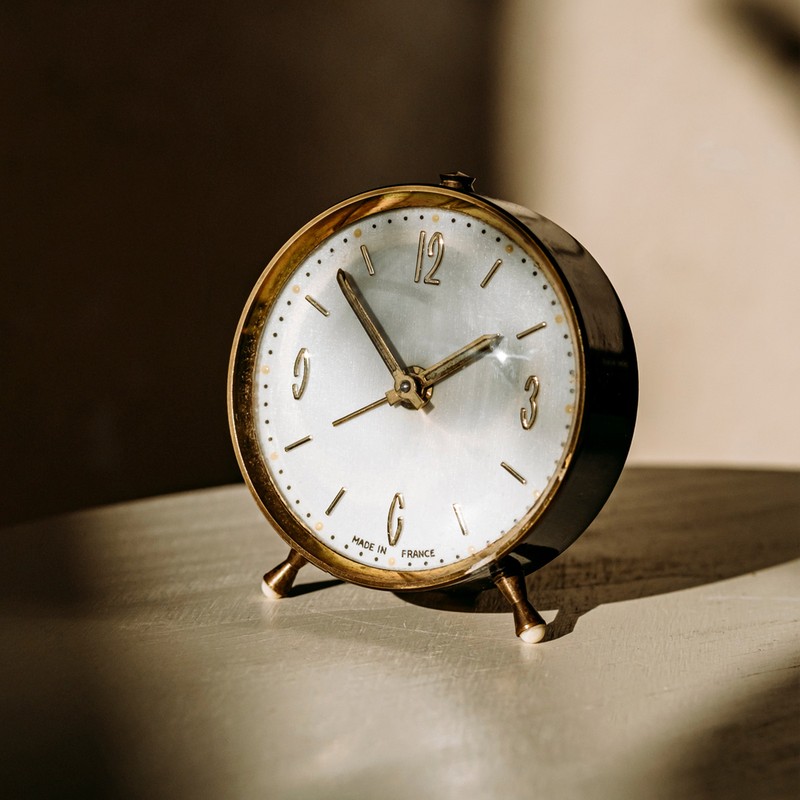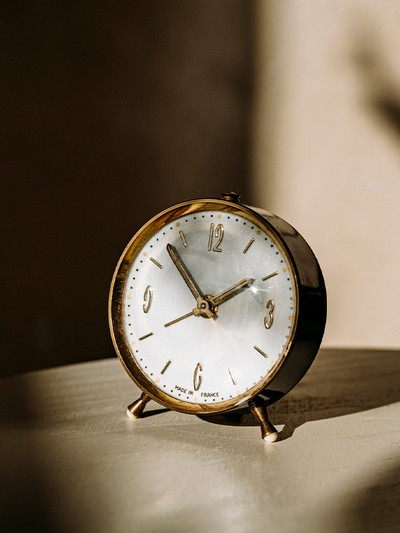

How To Reset Your Circadian Rhythm For A Better Night’s Sleep
DO…
Notice Your Energy Patterns
“For most adults, the biggest dip in energy happens in the middle of the night somewhere between 2am and 4am, when we tend to be fast sleep, and just after lunchtime, around 1-3pm, when many of us tend to crave a post-lunch nap. These times, however, can be different if you’re naturally a night owl or morning person. You also won’t feel the dips and rises of your circadian rhythm if you’re caught up on sleep. It’s when you’re sleep deprived that you notice bigger swings of sleepiness and alertness.” – Dr Satchin Panda, author of The Circadian Code
Spot The Signs
“If you’re experiencing brain fog in the morning, digestive issues, acid reflux, late-night hunger pangs, mild joint pain or body pain or are feeling low, lethargic and struggle to fall asleep, it could well be that your circadian rhythm is out of whack. While the circadian rhythm plays a central role in our sleep and energy levels, it also closely controls our genes, and is programmed to turn genes on or off at different times of the day. It therefore makes sense that when it’s out of balance, our overall health suffers.” – Satchin
Cut Back On Screen Time
“Daylight is one of the predictable environmental patterns our body relies on. Melatonin – the sleep regulating hormone – is released in the evening and dissipates in the presence of bright morning light. So, using bright artificial lights long after dark confuses our circadian rhythm, making it harder to fall asleep. Get into the habit of dimming your lights in the evening when at home and put your phone on silent or night mode as soon as you can – this will make you feel sleepier sooner. Never check emails, texts or social media 30 minutes before bed.” – Daisy Connor, nutritional therapist at City Survivor supplements
Dim The Lights
“We know the blue light emitted by electronic devices suppresses the production of melatonin, disrupting our sleep-wake cycle, but artificial light can also be used to support sleep. Lights with a lower brightness and warm colour, such as red or orange, can aid sleep and improve sleep quality. Consider changing your lightbulbs to warmer varieties and build them into your wind-down routine.” – Theresa Schnorbach, sleep scientist at Emma The Sleep Company
Have An Evening Routine
“While it’s commonly thought shift workers are those most affected by circadian disruption, it’s actually nine-to-five workers who tend to pay little attention to their circadian rhythm and are more at risk of throwing their delicate body clock out of balance. Staying up late into the night, sleeping less than six hours consistently for several days, staying up for an extra two or three hours on the weekend to socialise, and even having a late dinner for a couple of nights a week are all disrupting our circadian rhythms in the same manner as shift work does to shift workers.” – Satchin
Go For A Morning Walk
“Your circadian rhythm needs resetting on a daily basis. We are particularly insensitive to light in the morning, although it might not feel like it when turning on your bedroom light. By getting sunlight exposure first thing in the morning, you’re helping your body to release adenosine – a chemical that induces sleepiness – around 16 hours later, which puts pressure on you to fall asleep. During the shorter days of winter, using a bright light like a SAD lamp on waking is the next best thing to natural light.” – Tony Pemberton, wellness practitioner at Epic Genetics
Try A Supplement
“Nutrition can be helpful to influence the brain gently into regaining a natural sleep cycle. Low levels of magnesium can trigger insomnia, so supplementing it could resolve a root cause. For busy brains and stress, magnesium also activates GABA, a relaxing, calming neurotransmitter.” – Daisy
DON’T…
Ignore The Long-Term Consequences
“When your circadian rhythm is disrupted, the immediate repercussions are that your sleeping, waking and digestive systems are thrown off. Longer-term effects include increased risk of cardiovascular events, obesity and even neurological problems like depression and bipolar disorder. An unbalanced body clock can also contribute to weight gain – firstly, a sleep-deprived brain makes unhealthy food choices, making us more likely to reach for quick energy fixes like sugar and white carbs. Secondly, when we eat at the wrong time (e.g., a later dinner or not leaving enough time between dinner and breakfast), our bodies take longer to process that food and are more likely to store that energy as fat.” – Satchin
Have A Lie-In
“Sticking to a sleep schedule is vital for a healthy circadian rhythm. Try to be as consistent as you can, waking up at the same time every day. If you’re waking up two hours later on the weekends, it’s a sign you’re not getting enough restorative sleep during the week. And never hit snooze. If you feel the need to snooze, you need more sleep. Go to bed earlier; the best way to wake up refreshed is to have enough sleep by going to bed earlier.” – Satchin
Turn Up The Thermostat
“Our body temperature naturally drops when it’s time to sleep and research suggests that, if you sleep in a cooler environment, you can help your body fall into restfulness more easily. To optimise your sleep, your sleeping environment should be dark, cool and quiet. The temperature of your room should be cool but comfortable – this will differ for everyone, but around 16-19 degrees works for most. Ear plugs or a white noise machine can help in controlling disruptive sounds, while blackout curtains or blinds are a must to prevent light from disturbing your sleep. Your mattress and pillows should promote proper spinal alignment and your bedding should keep you cool.” – Theresa
Discount The Role Of Stress
“Falling asleep requires our body and mind to be relaxed, so stress and anxiety can impact sleep quality and disrupt sleep patterns. Vice versa, a lack of sleep can exacerbate feelings of stress or anxiety you may already be experiencing. Moreover, the activation of the body's stress response releases hormones such as cortisol that can interfere with sleep which can lead to increased wakefulness during the night. Engaging in relaxation practices like deep breathing, meditation or progressive muscle relaxation can help calm the mind and induce relaxation before bed. By encouraging slower breathing and activating the parasympathetic nervous system, yoga can increase the concentrations of the neurotransmitter GABA (also known as the brain’s tranquiliser) and relax both the mind and muscles.” – Theresa
Eat Too Much Sugar
“Maintenance insomnia – waking during the night – can be caused by low blood sugar, which you can avoid by having a rounded evening meal that includes protein for satiety. It could also be worth eating a dinner rich in tryptophan, an amino acid found in beef, poultry, dairy products, beans and lentils. Tryptophan directly influences melatonin, meaning it can help you sleep.” – Daisy
Exercise Too Close To Bedtime
“Exercise can improve sleep quality, increase sleep duration and even reduce symptoms of insomnia. If you’re looking to help regulate your circadian rhythm with exercise, it's important to think about both the type of exercise you’re doing and when you choose to exercise. Morning and afternoon exercise sessions have been shown to have positive effects on sleep quality. However, avoid vigorous exercise too close to bedtime as this can stimulate the body and make it harder to fall asleep. Instead, opt for relaxing activities such as stretching, yoga or light aerobic exercises in the evening to promote relaxation before bedtime.” – Theresa
Overdo Caffeine
“Caffeine can linger in the body for up to ten hours, meaning it should be limited to the morning only, especially if you struggle with your sleep. Remember caffeine isn’t limited to coffee – tea, some chocolate, energy drinks and some desserts also contain caffeine. Plus, decaf doesn’t mean it’s entirely caffeine-free, either.” – Dr Charlotte Gribbin, aesthetic physician at Dr David Jack
For more from the experts visit MyCircadianClock.org, EpicGenetics.co.uk, CitySurvivor.co.uk, DrDavidJack.com and Emma-Mattress.co.uk
DISCLAIMER: Features published by SheerLuxe are not intended to treat, diagnose, cure or prevent any disease. Always seek the advice of your GP or another qualified healthcare provider for any questions you have regarding a medical condition, and before undertaking any diet, exercise or other health-related programme.
DISCLAIMER: We endeavour to always credit the correct original source of every image we use. If you think a credit may be incorrect, please contact us at info@sheerluxe.com.

